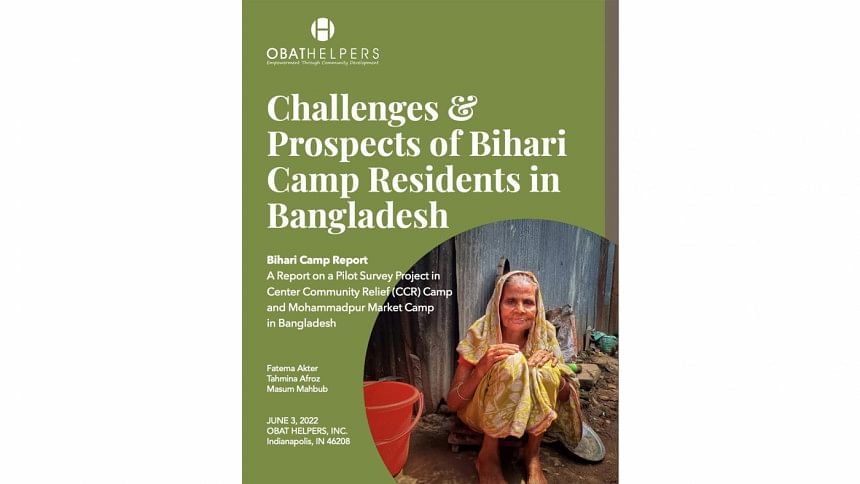The Plight of Bihari Camps’ Residents in Bangladesh

In 2008, the High Court Division approved a petition and formally acknowledged the Biharis as Bangladeshi citizens. However, the lives of the Bihari camp's residents are enshrouded with diverse issues due to their cultural identity, language disparity, political ideology, and their actions during the liberation war. Since 1971, 300,000 Biharis have been living in Bangladesh in 116 camps. OBAT Helpers, Inc. (hereinafter, OBAT), a USA-based non-profit working to develop the internally displaced community and refugee population in Bangladesh, conducted a pilot survey project on two Bihari camps in Dhaka.
The key findings of the survey are enumerated below:
Social Factors:
The Center Community Relief (hereinafter, CCR) and Market camps of Mohammadpur are an outcast from the mainstream population. 68.5% of the survey respondents mentioned facing a language barrier in communicating with mainstream society and accessing public facilities. The Bihari camp children go to nearby schools to receive a formal education. However, financial inability, child marriage, working outside the camp, looking after younger siblings, etc. make them drop out of school before graduation.
Health Factors:
Many camp residents use public bathrooms, where 1 bathroom is allocated for approximately 65 people. Cleanliness, congestion, and inadequate water supply are some constant struggles. For healthcare services, 71.25% of Biharis go to public hospitals, and the rest visit the private hospital, community hospitals, and Kabiraj. The camp residents use Dhaka Water Supply and sewerage authority (WASA) drinking water. Despite the current lifestyle, most camp residents (95%) are hopeful.
Physical Environment of the Camp
The living condition in the camps is below par. The camps lack proper air and light circulation. The incapacious and overcrowded camps worsen in the rainy season. Only 14.2% mentioned using a designated dumpster near the camp, while the others dumped the waste near the house and the local dumping yard. Despite such a precarious situation, 91% of the survey respondents considered their living conditions good.
Economic Factors
The substandard economic status of the camp dwellers has a massive impact on their deplorable living conditions. The professions of survey residents include barbers, drivers, rickshaw pullers, maids, handicrafts, tailors, butchers, small business owners, garment-factory workers, security guards, auto mechanics, carpenters, and electricians. Being skill-based professionals, the monthly income of most residents depends on the level of expertise and the time they work each month. Moreover, many of them had lost their work during the pandemic.
Gender-Based Discrimination and Violence Inside the Camps
98% of the residents agree that girls should not get married before 18. 89% concurred that women should be able to work only inside the camp area. 87.5% of respondents mentioned that women should be able to work outside the camp, even after marriage. These responses evinced the bright picture of the camp residents towards women's empowerment. However, other researchers discovered domestic violence is common in the camp area.
Political Factors
70% of the survey respondents feel that the mainstream Bangladeshi community discriminates against them as Bihari. The discrimination is conspicuous in accessing government services, hospitals, job placement, local facilities, legal aid, schools, shopping centres, and mosques. Bihari children are often prone to bullying and harassment in the school on the revelation of their identity and camp address.
OBAT's Activities in the Bihari Camps
Since 2004, OBAT has been committed to multi-folded sustainable development actions for the Bihari community living in Bangladesh. A few instances are providing k-2 level education, OBAT scholarship programs for the Bihari children, training and support, health care services, implementing awareness-building programs, etc. The persistent ventures of OBAT are also relevant to some of the Sustainable Development Goals.
Based on the pilot survey, the researchers have proposed short-term and long-term action plans for the sustainable development of the camp residents. Some of them are:
- Systematic planning and engineering for housing can improve the physical environment of the camps.
- A healthy and safe sanitation system and proper waste management must be implemented immediately inside the camps.
- Free education within the camps should be encouraged more.
- Women in the camps can be offered skill development training.
- WASA needs to test the quality of water they supply to the camp residents. The camps should have additional water distribution points, given that such a huge population lives there.
Informed decisions by the government and non-government agencies can mitigate the redress of the Bihari community.
The writer is an Official Contributor, Law Desk, The Daily Star.

 For all latest news, follow The Daily Star's Google News channel.
For all latest news, follow The Daily Star's Google News channel. 



Comments